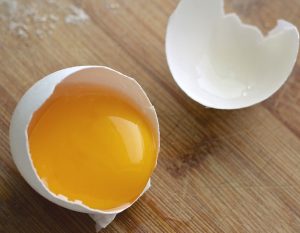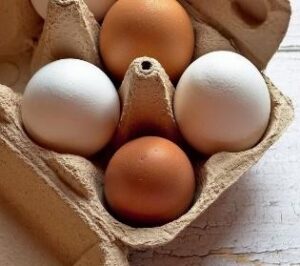 There is a lot of clucking about eggs these days. Between the shortage and cost, people are trying to take advantage of preserving any surplus supply they may find. This leads to more internet traffic and social media posts sharing ideas and techniques that may not be food safe. Water glassing eggs is one example.
There is a lot of clucking about eggs these days. Between the shortage and cost, people are trying to take advantage of preserving any surplus supply they may find. This leads to more internet traffic and social media posts sharing ideas and techniques that may not be food safe. Water glassing eggs is one example.
History of Preserving Eggs
Water glassing was a technique used in the early 1900’s to preserve eggs for an extended amount of time. It entails submerging clean, unwashed eggs in a lime and water solution. Back when this method was popular, it was thought eggs were sterile inside and all bacteria came through the shell after the eggs were laid.
Current Research
However, research shows Salmonella enteritidis can contaminate eggs as they are being formed inside the hen. Bacteria may be present within the hen’s reproductive tract before the shell is formed around the yolk and white so there is no way of knowing whether or not the egg is contaminated. This is even a greater risk for eggs from smaller home flocks which tend to have a higher incidence of Salmonella compared to large commercial operations.
Additionally, egg shells are porous. So another concern about the water glassing method is the fact the lime water could seep through the eggshell. This can create a strong bitter taste. Eggs that are stored for long periods of time lose nutrients and undergo several oxidative reactions as well as changes in protein functionality. Today, due to advancements and knowledge of safety, water glassing eggs is not recommended.
Best Preservation Method for Eggs
Refrigeration is the best method of storing eggs safely. It also helps preserve the quality longer. Eggs should be stored in the refrigerator or a cooler between 33 – 41 degrees F. Whole eggs can be stored up to five weeks from when they are purchased. The “Sell-By” date may expire during that time, but the eggs will be safe to eat as long as they have been stored and handled properly.
Another method for preserving is freezing eggs. Eggs can be frozen just as yolks, whites or mixing the whole egg together. To prevent graininess you will need to add sugar, corn syrup or salt to the egg mixture. They will need to be frozen in food safe containers with 1/2 inch headspace. Freeze eggs in the amount that you will typically use in a recipe. Label your containers with the amount, date and any added ingredients such as sugar or salt. Thaw frozen eggs in the refrigerator. Make sure that you stir or shake them before cooking. You will want to use thawed eggs within 3 to 5 days.
What if an egg floats in water? This basically means it is old and the air cell inside has gotten large enough to keep the egg buoyant. Typically it is perfectly safe to use, but crack it separately to check for off-odors or unusual appearance before doing so.
Source: Adapted from KS State University and Research, Karen Blakeslee, November 13, 2020.


I’ve noticed in many countries other than the USA, chicken eggs sit out in the shops un-refrigerated and unwashed. I’m told that unwashed eggs straight out of a chicken’s butt come with a natural coating that helps preserve them. That seems disgusting, but it also seems to work.
If I can get eggs from a backyard coop, I don’t wash them until just before I crack them open.
— John Kiljan
John,
Thank you for your question. Poultry lay eggs with a protective coating called ‘bloom’. This is to provide protection for the egg, especially the embryo. Eggs are considered permeable, therefore protecting the eggs through refrigeration can assist in lowering the potential growth of salmonella. Please reach out to your local Extension office is you have more questions.
Thank you!
Live Smart Colorado
I am going to be sharing this with people